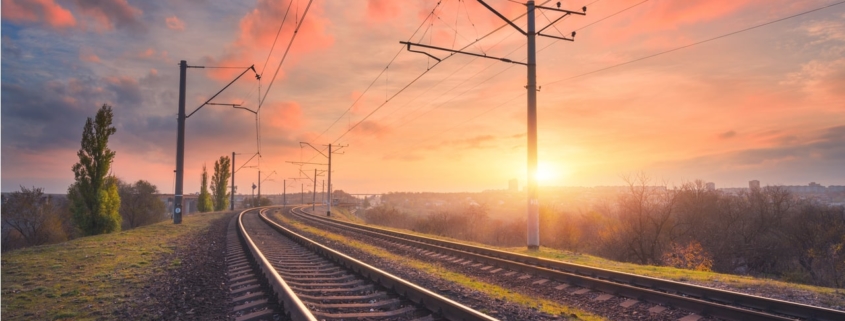What are the Causes of Railway Accidents?
Trains are widely presumed to be a safe way to travel. However, railway accidents are more common than most people believe. Each year, there are thousands of accidents with injuries involving trains, and hundreds of individuals are killed in these types of accidents. There are also dozens of train derailments each year that result in the spilling of toxic substances, thus requiring those nearby to be evacuated.
There are several different types of train accidents, these include:
- Derailments
- Train-Train Collisions
- Train-Vehicle Collisions
- Train-Bicycle Collisions
- Train-Pedestrian Collisions
The majority of railway accidents are train-vehicle collisions, and most of them occur at railroad crossings. There are nearly 6,000 of these types of crashes each year in the U.S., killing approximately 600 people and injuring about 2,500 more.
What Causes Railway Accidents?
There are number of reasons why train accidents occur, some of the most common causes include:
- Train Operator Error: Human error is a contributing factor in a large number of railway accidents. This could be due to poor training, inexperience, reckless behavior, or a combination of these. Some examples of reckless behavior include operating the train while intoxicated and driving the train too fast.
- Track Problems: Track owners are responsible for keeping their tracks maintained and in good repair. Over time, tracks become worn and broken, which can cause train derailments and other problems.
- Lack of Warning Signals: A large number of railroad crossings in Alabama and throughout the country do not have warning signals installed. This is particularly common in rural areas, where those in charge of these crossings often do not have the budget to make them safer. Without a warning signal, motorists, bicyclists, and pedestrians may not realize that a train is coming until it is too late.
- Warning Signal Defects: Many crossings have warning signals installed, but they have not been maintained properly or there may be a faulty part that malfunctions. Whichever is the case, a defective warning signal is nearly as bad as having no warning signal at all.
- Obstructed View of the Railroad Crossing: Those responsible for railroad tracks and crossings are supposed to keep the area clear and maintain a line of sight for vehicles to see them. If trees and other vegetation become overgrown, it can obstruct the view of the crossing, making it difficult for motorists, bicyclists, and pedestrians to see it.
- Stalled Vehicles: Some train-vehicle crashes happen because a vehicle gets stalled on top of the track, often due to a mechanical failure or a faulty vehicle or vehicle part.
- Distractions: Some railway accidents are caused by distractions such as sending texts or other smartphone activity. Anyone is susceptible to the temptation of being distracted by their smartphone; this can happen to the train operator, or a driver, bicyclist, or pedestrian who may be crossing the track.
- Faulty Equipment: A train accident can happen because of a defective train or train component, or some type of mechanical defect. For example, if a train experiences a brake failure, it may not be able to stop in time to prevent a collision.
How to Prevent Railway Accidents
Trains typically weigh between 80,000 and 400,000 pounds, and the last thing any of us want is to collide with one of them at a high speed. Here are some tips for preventing railway accidents:
- Always be on the lookout for warning signs and signals when approaching a railroad crossing;
- Always assume that a train could approach at any time;
- Whether you are walking, biking, or driving, only cross railroad tracks at designated crossing areas, and never walk on or alongside the tracks;
- Always look both ways before crossing a railroad track;
- Be aware that trains cannot stop quickly, and never try to beat a train across the tracks;
- Never stop your vehicle on top of a track, and if your vehicle stalls, get out of it immediately;
- Never, under any circumstances, attempt to board a moving train.
Injured in a Railway Accident in Alabama? Call the Experienced Train Accident Lawyers at Burge & Burge
Even if you do everything possible to prevent a railway accident, they can still happen because of the negligence or reckless actions of other parties. And when these accidents occur, filing a claim to recover compensation for your injuries can be a complicated process. There are multiple parties that could be potentially liable, and this could include a government entity, which would involve an entirely different set of procedures.
At Burge & Burge, we have many years of experience representing clients injured in railway accidents and those who have suffered all other types of personal injuries in Alabama. We have in-depth knowledge of this area of the law, and a successful track record with even the most complex cases. We can meet with you to thoroughly assess your case and advise you of your legal rights and options.
For a free consultation with one of our attorneys, call us today at 205-251-9000. You may also message us through our web contact form or stop by our Birmingham office in person at your convenience.




Leave a Reply
Want to join the discussion?Feel free to contribute!